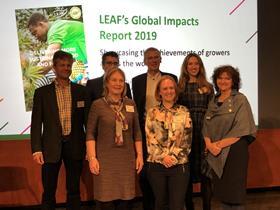
Almost two fifths of the fruit and vegetables produced in the UK are now grown by LEAF Marque-certified farms, it has been revealed, with the environmental assurance system claiming certification will position agricultural businesses well for life after Brexit.
The organisation’s Global Impacts Report, launched at the LEAF Marque Summit in London on 21 March, shows that 973 farm businesses spanning 27 countries are now engaged with the standard, with the percentage of LEAF-certified fresh produce grown in the UK rising from 25 to 39 per cent in the last four years.
LEAF Marque chairman Tom Green said: “Our work is vital in addressing global challenges on climate change and as we face possible exit from the European Union, with much attention focussed on the nature of trading relationships outside the EU, and the UK government policy prioritising the environment and the delivery of ‘public goods’, there is no doubt that LEAF Marque certified businesses will be well positioned.”
The report highlights the impressive progress made by LEAF Marque-certified producers across the globe in delivering more sustainable farming, as well as outlining LEAF’s plans for the future, including targets to broaden its global reach and continue to invest in improving management tools, training and services for growers.
In the UK, LEAF Marque’s prominence in the fresh produce sector has grown for the seventh year, with many fruits and vegetables now almost exclusively grown by LEAF Marque-certified businesses. For example, leeks are 95 per cent LEAF-grown, lettuce 89 per cent, watercress 83 per cent and beetroot 78 per cent.
According to LEAF, certified businesses are making improvements across all nine areas of Integrated Farm Management, which underpins the Marque. Soil health is a key area withfour in ten farms recording the organic matter in their soil to build resilience and productivity.
Other resources including water and energy are also being carefully managed by certified businesses. For example, 67 per cent manage reservoirs for water quality, safety and/or wildlife; 48 per cent have one or more types of renewable energy generation; and 52 per cent carry out waste management best practice.
LEAF Marque-certified businesses are also working towards important social sustainability targets to build community support and engagement. Almost 72,000 visitors were recorded in 2018, including school children, farmers, industry representatives and agricultural college and university students.
LEAF chief executive Caroline Drummond said: “There is no magic bullet to optimising sustainable food production. It requires collective efforts of farmers, governments, retailers, NGOs, the research community and individuals.
“We must all work together to achieve shared outcomes – more productive soils, cleaner water and air, greater biodiversity, efficient energy use and improved connections with people, farming and the natural world.”
She added: “We are determined to remain a leading catalyst for improved farm management, contributing to the sustainability of our farmed land and supporting food security and livelihoods in line with the UN Sustainable Development Goals, as well as national objectives set out in the Government’s 25 Year Environment Strategy.”
The UK has the largest LEAF Marque-certified crop area at 305,465 hectares, followed by Spain at 27,025ha and France at 13,855ha.
Globally, the arable and horticulture sectors are the two areas of agriculture with most hectares covered by LEAF certification at 185,084ha and 167,979ha respectively.
In total, 160 different crop types and livestock classes are covered by the LEAF Marque.



